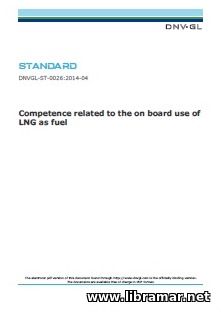 The crew of any vessel fuelled with the liquid natural gas must be able to timely and properly recognize all possible risks and be aware of all specific points of attention that are associated with LNG; in addition to that, crew members must always be able to operate any system related to this.
Moreover, crew should be able to perform the associated LNG-bunkering operations (shipboard) in a controlled and safe way, recognize potential problems and handle all possible emergency situations relating to liquid natural gas. The present performance standard was developed and published by DNV GL classification society with the aim to describe how well or to what level of detail the crew members should perform their duties and tasks related to LNG.
All applicable performance criteria are aimed at risk reduction and a constant safety awareness is considered a basic condition to work with or near the LNG. The crew members will comply with all relevant national/international/local requirements and regulations, and the ship and shipboard equipment shall be operated in a safe manner without any threat or damage to human life, environment or property. The five sections of the standard provide introduction to the subject, information on the taxonomy, competence table, use of this standard, and list of references.
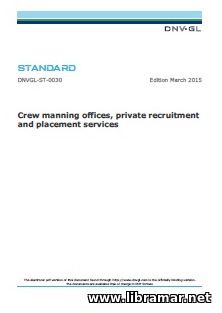 This DNV GL standard no. DNVGL-ST-030 has quite self-explanatory title. The standard was prepared and officially released by DNV GL class society to provide all necessary requirements to CMOs, i.e. crew manning offices, and to recruitment/placement services; it will assist in ensuring safety against various safety hazards that may be faced by the ships, crew members and passengers, cargo, and surrounding environment.
The present regulatory publication has been divided by the authors into two main parts covering crew manning services and private recruitment/placement services, with both parts covering application and certification information, and applicable requirements. It shall be noted, however, that the first part of the booklet, dealing with the manning offices, is not intended in any way to embrace or define the regulatory requirements in detail. Such offices shall comply with all relevant national/international requirements and, of course, with what is called the good practice.
The offices may have quality objectives in addition to the those included in this standard. In that case, the certification may be extended to verify that all arrangements required for the achievement of these objectives are implemented/maintained.
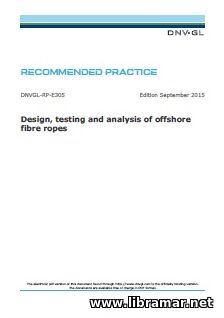 This recommended DNV-GL practice aims to provide necessary recommendations on how to document that offshore fibre ropes for delivery will be fit for purpose. It provides general recommendations and information pertaining to synthetic lines intended for the offshore use.
This DNV-GL recommended practice addresses three main areas: design of synthetic lines for intended offshore use, testing of performance characteristics for synthetic lines, and analysis of synthetic lines as part of an integrated system. The paper is released to provide recommendations for proper design, testing and analysis of various synthetic lines intended for use in offshore mooring systems as described in DNVGL-OS-E301, deepwater deployment/recovery systems as per the DNV-OS-E407, and any other offshore applications.
Please note that the present document does not deal with the fitness of the offshore fibre ropes for the intended purpose, when in use. Here are some key aspects which this recommended practice emphasises - the ropes in question shall be analyzed based on the amount of load-bearing material in their cross-sections as well as the mechanical characteristics of the materials these ropes are made of; another aspect will be the tension vs stretch behaviour; and the last one is the endurance and strength of the synthetic/steel-wire rope...
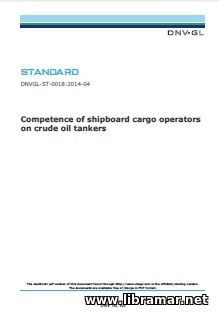 Here is the final one of the series of the competence-related standards developed and published by the DNV GL classification society and this document is dedicated to the shipboard cargo operators working on the tankers transporting the crude oil.
Such cargo operators shall be able to prepare the tanker for loading and discharge of the cargo, safely load the crude oil into the suitable tanks, ensure that the cargo intended for transportation is duly treated in the course of the transit, properly analyze the associated risks and determine the requirements for segregation, log all required data, discharge slops and vapours in the safe and environment-friendly way, efficiently strip and discharge the cargo etc. The arrangement of the standard is absolutely similar to the one of the any other personnel competence-related standard released by this classification society.
Each of the competence requirements would derive from a task to be performed by the operator. The document contains literally all information for the assessment of the cargo operators and will be very useful for the personnel willing to improve their skills associated with what is considered the scope of the standard.
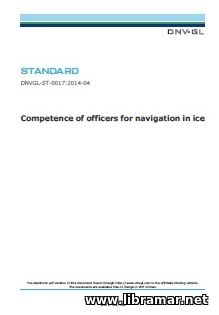 One more standard released by DNV GL classification society and dealing with the personnel competences. The document is mainly focusing on the performance areas of the officers treated as responsible persons for ship operation, course and speed of a ship in cold weather condition, i.e. when the temperature falls below zero Celsius and/or when sailing in the ice infested waters - the whole time frame from voyage planning phase to the moment when the ship leaves the area, is covered.
The publication is focusing on the navigational as well as normal operational matters, when all of the crew members remain on board the vessel. It should be noted that personal survival and emergency evacuation techniques in cold weather conditions are not part of the scope of the present standard. The document contains a set of requirements related to the competence for navigation various ice-conditions and ice-infested areas all over the world.
The target group for this standard are the ship's officers that are considered responsible for safe navigating of the vessel in the conditions stated above in this text. Again, pretty regular arrangement of the document, containing introduction with brief explanation of the scope, taxonomy and competence requirements.
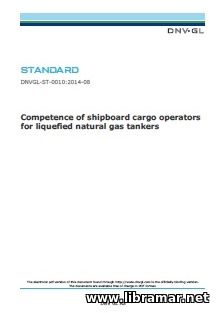 One more DNV GL competence-related standard. This publication was prepared and intended for the ship's senior officers who must be capable of performing their duties and tasks relating to cargo handling on board LNG, i.e. liquefied natural gas carriers. Note that this document specifies competence requirements above ones of STCW Convention and any other relevant national requirements.
The arrangement of the standard differs a bit from the similar publications providing requirements to the tender operators or operators working on the product tankers etc. Of course, the introductory section is there along with the section dedicated to the taxonomy. The third section of the booklet provides competence requirements and test matrix, while the last, fourth, section provides necessary information on proper assessment of the shipboard LNG cargo operators, namely requirements for qualification of examiners/assessors, cargo handling simulator, and for additional testing, as well as testing protocols and assessment criteria for use by assessors/examiners - it provides readers with some practical assignments for better illustration of the requirements listed in the main body of the standard.
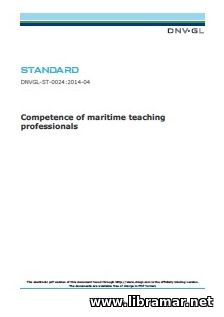 Another DNV GL standard on competencies - this one is dedicated to the competence of maritime teaching pro's. These professionals must know how to properly prepare and effectively deliver the program to the students and make sure that they have met the training objectives by the end of the program.
Note that the maritime simulator-specific items are not addresses by this standard; however, they may all be found in the separate DNV GL standard no. DNVGL-ST-0025 Competence of Maritime Simulator Instructors, also available at our website. The complete professional profile of the professionals would typically include defining performance aims and training needs, converting those aims and needs into a training program, designing a program and any relevant training material, taking into consideration characteristics and limitation of the available equipment, delivering a program and meeting the established objectives of the program, and, of course, assessing the students.
The arrangement of the document is standard, nearly same as the one of the similar standard providing requirements to the competence of the maritime simulator instructors - introduction, taxonomy, competence requirements.
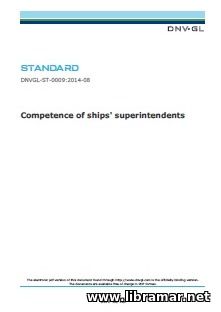 The target group for the present DNV GL standard consists of the ship superintendents, as it is implied by the title of this officially released document. The publication was prepared by the professionals of one of the leading and world recognized classification society that is why the information contained in the booklet will be thorough and comprehensive by default.
The list of the requirements applicable to the ship superintendents is provided in the "Professional profile" section of the booklet. In general, the arrangement of this standard is as follows: it starts with the intro part providing the levels and categories of competences, followed by the part dealing with the taxonomy, levels of cognition and professional behaviour verbs.
The three following sections provide the competence requirements for general, marine and technical applications, accordingly. The last section of the document provides some practical information on the possible uses of this DNV GL standard. The publication will definitely be useful for the shipping companies, ship operators and crew members willing to get better idea on the requirements that the ship's superintendents shall meet.
« 1 2 ... 22 23 24 25 26 ... 29 30 » |







